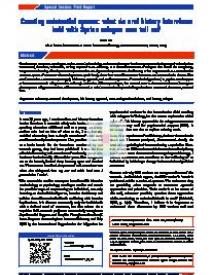Creating existential spaces : what do oral history interviews held with Syrian refugee men tell us?
The dominant narratives on refugees evolve around vulnerability and trauma discourse that homogenizes a whole group of individuals as traumatized, therefore, vulnerable, as they exposed to an adversity. It is the self-narratives of refugees that reveal the complexity, uniqueness and totality of each person’s experience that can object to this passivation. Oral history in this respect stands as a crucial tool as it creates spaces of existence where refugees can speak freely about their own life stories to the extent and content she/he desires.
This small research is a naïve attempt to apply life history approach, and oral history as one of its methodological tool, to psycho-social support at the intersection with refugee studies. Although evolved in different paradigms, this research aims to demonstrate that oral history can also empower refugees since their self-narratives stand as valid sources of reality to challenge the above mentioned discourses, now and then.
In: Intervention: Journal of Mental Health and Psychosocial Support in Conflict Affected Areas, ISSN 1571-8883 | 16 | 2 | 181-186
http://doi.org/10.4103/INTV.INTV_47_18


